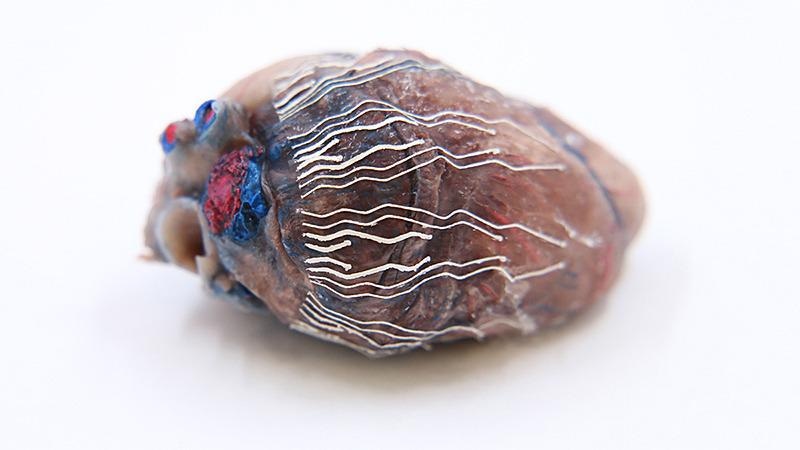Jun 18 2021
A novel, patent-pending Purdue University biosensor that can be printed in 3D with an automated printing technology may soon allow surgeons to localize crucial areas in organs and tissues during a surgical operation.
 A fully printable biosensor made of soft bio-ink interfaces with a pig heart. Research about the biosensor, developed by researchers at Purdue University and Los Alamos National Laboratory, has been published in Nature Communications. Image Credit: Bongjoong Kim.
A fully printable biosensor made of soft bio-ink interfaces with a pig heart. Research about the biosensor, developed by researchers at Purdue University and Los Alamos National Laboratory, has been published in Nature Communications. Image Credit: Bongjoong Kim.
Chi Hwan Lee invented the biosensor, which enables concurrent recording and imaging of organs and tissues during a surgical procedure. Lee is the Leslie A. Geddes Assistant Professor of Biomedical Engineering in the Weldon School of Biomedical Engineering and assistant professor of mechanical engineering. He also holds a courtesy appointment in materials engineering.
Simultaneous recording and imaging could be useful during heart surgery in localizing critical regions and guiding surgical interventions such as a procedure for restoring normal heart rhythms.
Chi Hwan Lee, Leslie A. Geddes Assistant Professor, Biomedical Engineering, Weldon School of Biomedical Engineering
Standard techniques to concurrently record and image organs and tissues are known to be difficult because other kinds of sensors used for recording purposes generally disrupt the imaging process.
To this end, we have developed an ultra-soft, thin and stretchable biosensor that is capable of seamlessly interfacing with the curvilinear surface of organs; for example, the heart, even under large mechanical deformations, for example cardiac cycles. This unique feature enables the simultaneous recording and imaging, which allows us to accurately indicate the origin of disease conditions: in this example, real-time observations on the propagation of myocardial infarction in 3D.
Chi Hwan Lee, Leslie A. Geddes Assistant Professor, Biomedical Engineering, Weldon School of Biomedical Engineering
Biosensors accommodate a range of shapes and sizes of an organ by utilizing soft bio-inks during the rapid prototyping of a customized design. Softer than tissue, the bio-inks stretch without causing any degradation to sensors and have a consistent natural adhesion to the moist surface of organs without requiring any extra adhesives. Kwan-Soo Lee’s research team from Los Alamos National Laboratory is in charge of the bio-ink formulation and synthesis.
Many prototype biosensors in various sizes, shapes and combinations have been created. Craig Goergen, the Leslie A. Geddes Associate Professor of Biomedical Engineering at Weldon School of Biomedical Engineering of Purdue University, and his research team have evaluated the prototypes in pigs and mice in vivo.
Professor Goergen and his team were successfully able to identify the exact location of myocardial infarctions over time using the prototype biosensors. In addition to these tests, they also evaluated the biocompatibility and anti-biofouling properties of the biosensors, as well as the effects of the biosensors on cardiac function. They have shown no significant adverse effects.
Chi Hwan Lee, Leslie A. Geddes Assistant Professor, Biomedical Engineering, Weldon School of Biomedical Engineering
The biosensor research has been published in the peer-reviewed journal, Nature Communications.
Journal Reference:
Kim, B., et al. (2021) Rapid custom prototyping of soft poroelastic biosensor for simultaneous epicardial recording and imaging. Nature Communications. doi.org/10.1038/s41467-021-23959-3.
Source: https://www.purdue.edu/